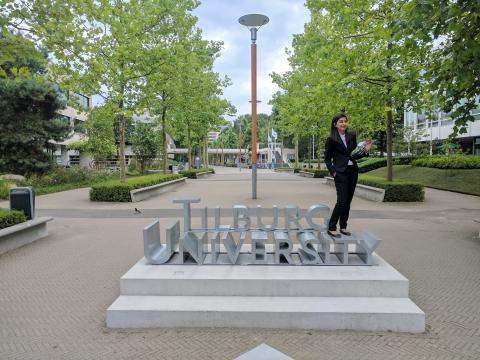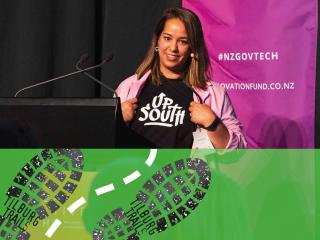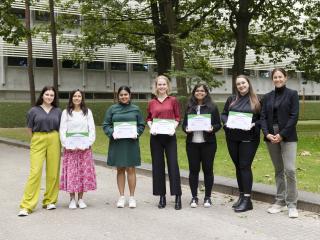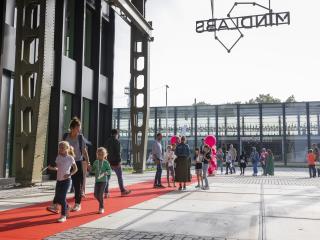In Tilburg, Fizzah discovered her true passion
Where are our international alumni now? Have they stayed, have they gone home, or have they landed somewhere else in the world? What have their studies brought them? Do they still carry Tilburg University with them? What path has former student Fizzah Malik traveled after she graduated from Tilburg University?
The realization that I don’t have to hold back in expressing my opinion
Pakistan
Master’s program in Behavioral Economics
Fizzah Malik (30), an Economics graduate of Tilburg University, is one of the students who was able to pursue academic studies at Tilburg University thanks to a scholarship granted by Tilburg University Fund. Her student days in Tilburg broadened her horizon and they ended auspiciously: in 2017, she graduated on her 24th birthday. Her visa to the Netherlands was still good for a few months and she spent them applying for research positions. Not meeting with success, she returned to her hometown in Pakistan, Lahore, where her love for behavioral sciences has stood her in good stead in a variety of activities.
After I graduated from Tilburg …
In the six years that have passed since Fizzah graduated, she has been far from idle. Back home in Pakistan, she engaged in environmental research on the impact of green buildings on pro-environmental beliefs in closed communities at the Lahore University of Management Sciences and subsequently worked on a health project aimed at fathers and their involvement in pregnancies. In 2020, the Covid-19 pandemic thwarted her plans for a PhD but did land her a new research commission relating to the virus. She took part in research projects for the police, were she worked to increase citizen engagement and trust in state services by using different interventions, and finally to return to a theme she’s very familiar with: health in relation to pregnancy. “True, I have a broad orientation and for the past six years I have taken numerous byways,” she says with a smile. “But these byways converge on my primary field of interest: Behavioral Economics. This field explores ways to create positive and lasting changes in human behavior and it can be applied to a wide range of themes, including health and sustainability.”

From day one, I observed the significance of cultural differences in practice
Tilburg broadened my world view
The seeds of her broad interest were planted in Tilburg; previously her main focus had been on education. She had worked to improve education for children in Pakistan, as she shared in an earlier interview with Tilburg University Magazine. “Before I came to Tilburg, I had never been abroad. From day one, I observed the significance of cultural differences in practice. In the Netherlands, people often travel by bike, bus, or train; in Pakistan, we mostly drive or take a taxi. Partly as a result of that difference, the air in the Netherlands is a lot cleaner than the air in Lahore. And it made me think. When people get on a bike or take the train, they are making the right choice, whether by choice or by accident, for the benefit of their health, urban quality of life, and the environment – and without the government offering them some kind of reward. I started doing that, too, and changed my routine. It also sparked my interest in behavioral sciences and in nudging people towards making the right choices.”
Tilburg’s impact on me
Her homeland broadened Fizzah’s interest in education to a much wider range of topics. “Pakistan has quite a few issues it needs to tackle, like better and more equal healthcare, more efficient use of water, and higher climate awareness. And yes, education is another one of these issues.” Back home in Pakistan, she is keen to put her new insights and skills to practical use by means of a particularly persistent native cultural feature. “In our culture, people often worry about what others think of them. ‘What you do has an impact on you and on what others think of you’ is part and parcel of how we are raised. It wasn’t till I was older that I found out that it really doesn’t matter all that much what people think of you.” That has given her an idea: “What if I were to use this socially ingrained habit to foster positive behavioral changes? That’s what I’d like to be the focus of my PhD project.”
Fizzah’s connection with friends she made in Tilburg remains strong, and she enjoyed the cultural exchange and discussions with fellow students from all over the world. “Before I came to Tilburg, I was an introvert; I wasn’t one to speak my mind. In Tilburg, I learned to take part in discussions and, in the process, to share my views as well as to ‘read’ the opinions of others from all manner of cultural backgrounds. I learned how to form a well-substantiated opinion. It made me more confident. It’s a life lesson that benefits me as a researcher and as a person every day.”
I have always worked hard, but true resolve I mastered in Tilburg
In Tilburg, she also learned the meaning of determination: truly wanting something and getting your teeth in it will get the job done. “I have always worked hard, but true resolve I mastered in Tilburg. It was here that fellow students truly encouraged me. I fondly remember the group projects I was involved in: working towards a goal together, learning together, building on each other’s ideas while at the same time working independently on our separate project tasks.”
It wasn’t just cultural differences Fizzah observed; she also discovered that people in Pakistan and Europe are much alike. “In Tilburg, I met someone whose mother had never been abroad. Thinking that only applied to Pakistanis, I had not expected people from the Western world to have the same experience. That, too, added nuance to my understanding of the world.”
My impact on Tilburg
“I was the only female student from Pakistan in our group. This meant I brought my native cultural perspectives to the table as well as my academic skills that earned me the Tilburg scholarship. What I also brought to the table, and in hindsight it’s quite funny, was the interest I took in all things European. Every free weekend I would travel to a Dutch city, like Haarlem and Leiden. I visited the island of Texel and cycled to the Belgian border. Friends would ask me why I would do all that, to which I would reply: I’m intrigued, I want to learn what it’s like there, how people live there, because for me it’s a totally different culture. To Dutch people and Europeans it’s more or less familiar. They were fascinated by my enthusiasm and my fresh outlook on their culture; it taught them to look at their own country in a different way.”
Date of publication: 13 November 2023



